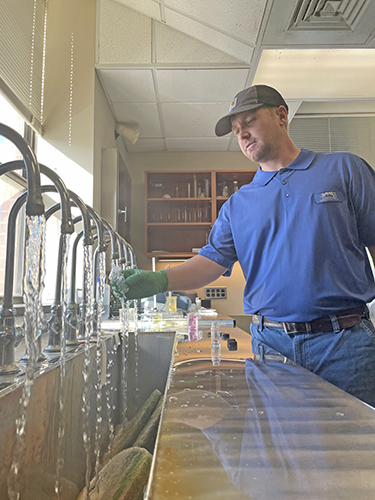Water Service

PWC is committed to supplying safe water that meets or surpasses state and federal standards and achieves the highest standards of customer satisfaction. PWC draws water from two independent water sources, the Cape Fear River and Glenville Lake. P.O. Hoffer and Glenville Lake Water Treatment Facilities have a combined treatment capacity of 58 million gallons a day (MGD), with an average demand of 21.788 MGD in FY2023. PWC’s all-time peak demand of 42.25 MG has held since 1999. The peak consumption for FY2023 was 41.476 MG and occurred on July 22, 2022.
PWC provides water services to over 225,000 customers both inside and outside city residential, commercial, and industrial customer classes, as well as City and PWC facilities. This includes the 1998 merger with the Town of Hope Mills. PWC also provides wholesale water service on a contract basis to Spring Lake, Stedman, and Hoke County. In 2010, PWC, along with Harnett County Public Utilities Department, began supplying Fort Liberty through a 40-year contract with the Department of Defense.
During FY2023, 10.711 billion gallons of drinking water were treated. After treatment, water is delivered to customers through an extensive distribution system consisting of over 1,419 miles of underground piping. Current projections indicate the population served by PWC will exceed 300,000 by year 2030 with a total system demand approaching 48 MGD.
PWC has utilized chloramination as its disinfection method since 2003. In 2008, PWC implemented year-round outdoor watering schedules to support water conservation efforts and better manage its system peak.
PWC earned the distinction as the first utility in North Carolina to be recognized with the Partnership for Safe Drinking Water’s Director’s Award for outstanding commitment to quality drinking water treatment. Every year since receiving the award in 2000, PWC has continued to maintain the award’s high standards. In 2023, PWC was recognized for meeting the standards for 21 consecutive years. In FY2023, both PWC water treatment facilities, once again met all criteria for the Partnership’s Director’s Award and NCDEQ Area Wide Optimization Program award. PWC is a charter member of the Partnership for Safe Water Distribution System Optimization program, which focuses on the operation and maintenance of our distribution system.
Fayetteville Drinking Water History
The first water service in Fayetteville was installed before the Civil War and the source of water was Fountainhead Spring. Water traveled by gravity through hollow logs to the heart of the city. Some of the logs that have been excavated in recent years are still in good condition, although unused for many years.
The first organized effort to supply water to Fayetteville was by the Robinson Family, probably in the 1890’s, when Glenville Lake was formed. At that time, it was known as Robinson’s Pond. This system was taken over by a Mr. Richardson, from New York, who later sold it to the McNeill’s. In 1903, the McNeill’s sold the system to the City of Fayetteville.
The first water filtration plant was installed by PWC on Glenville Lake in 1912. The contractor agreed to complete the plant for the sum of $18,000. The first building stands on the opposite side of the lake from the present Glenville Lake Plant. The original capacity of this plant was 1,000,000 gallons of treated water per day (MGD).
The present plant on Glenville Lake was built in 1942 with a capacity of 3 MGD. Fayetteville’s population at that time was 18,000 people. The plant was expanded in 1949 to 5 MGD; in 1954 to 8 MGD; in 1961 to 12 MGD; and in 1994 to its ultimate capacity of 18 MGD.
Contracts were awarded in July 1967 for construction of a second water purification plant, located on the Cape Fear River. This new plant was designed so that it can be expanded in increments to an ultimate treatment capacity of 96 MGD. Named in honor of P.O. Hoffer, a former chairman of PWC, the Hoffer Plant initially treated 8 MGD. In 1975, an 8 MGD expansion brought the treatment capacity to 16 MGD, a 16 MGD expansion was completed in May 1988 that gave the P.O. Hoffer Plant a treatment capacity of 32 MGD. In 2005, PWC received approval from the State of North Carolina to increase Hoffer’s maximum capacity to 39.5 MGD. Phase 1 of a 3-phase, 6-year upgrade and expansion began at the P.O. Hoffer WTF in 2014; Phase 1A and 1B dealt primarily with reliability improvements. Phase 1A was completed in January of 2017. Phase 1B was completed in February of 2018. The design of Phase 2 is currently underway. Phase 2, when complete, will increase P.O. Hoffer’s maximum capacity to 48 MGD. Construction on Phase 2 is contingent on future water demands.
Through the foresight of Fayetteville’s forefathers, the citizens of Fayetteville have, in their PWC, a significant community asset with a proud history. PWC has kept abreast, through the years, with demands for a water utility to serve the rapidly growing city and the surrounding urbanized areas.
Partnership for Safe Water
- 21-Year Director’s Award (2022)
North Carolina Waterworks Operators Association
- A-Surface Operator of the Year:
- Gary Thompson (2021)
- David Faircloth (2020)
- David Robinson (2018)
- C-Surface Operator of the Year: DeQuante Moore (2021)
- Outstanding Operator of the Year: Chris Smith (2018)
- Lifetime Member Award:
- Delmer Coffman (2022)
- David Robinson (2021)
- Gary Thompson (2021)
- James Gibson (2018)
- Chris Smith (2017)
- President’s Award: Chris Smith (2015)
North Carolina Waterworks Operators Association – Southeast Section
- Thomas C. Flowers Award for Outstanding Service:
- Delmer Coffman (2022)
- Jason Green (2021)
- Chris Smith (2008)
North Carolina One Water
- Golden Manhole Award: John Allen (2018)
- Best Tasting Water Competition:
- 3rd Place: Glenville Lake & P.O. Hoffer Water Treatment Facilities (2018)
- 1st Place: Glenville Lake & P.O. Hoffer Water Treatment Facilities (2005)
- Walter Courmon Safety Award: P.O. Hoffer & Glenville Lake Water Treatment Facilities (2015)
North Carolina Department of Environmental Quality
- Area Wide Optimization Program Award:
- P.O. Hoffer Water Treatment Facility: 2021-2022, 2020-2021, 2019-2020, 2018-2019, 2012-2013, 2011-2012
- Glenville Lake Water Treatment Facility: 2021-2022, 2016-2017, 2015-2016, 2012-2013
Cape Fear River Assembly J.W. Pate Award
- Chad Ham (2016)
- Steve Blanchard (2009)
- Tim Woods (1991)
- Ray Muench (1989)


